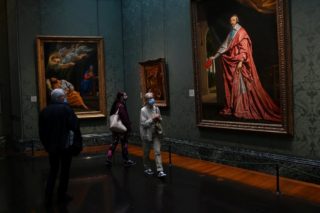LONDON — Britain’s arts sector, largely shuttered since March because of the pandemic and warning of an imminent collapse, is being given a lifeline through what Prime Minister Boris Johnson described as a “world-leading” rescue package for cultural and heritage institutions.
The organizations will be handed 1.57 billion pounds, about $2 billion, the culture ministry said on Sunday evening.
Mr. Johnson said in a statement that the money would “help safeguard the sector for future generations, ensuring art groups and venues across the U.K. can stay afloat and support their staff whilst their doors remain closed and curtains remain down.”
The money will go to a variety of recipients, including Britain’s “local basement” music venues and museums, he added, although he did not provide details. Museums in England were allowed to reopen on Saturday, but it is unclear when theaters and music venues will be permitted to.
Although Mr. Johnson’s claim that the package is “world-leading” aligns with his tendency toward hyperbole and tub-thumping, the figure is on par with rescue packages for the arts in Europe’s largest nations.
On Friday, Germany’s Parliament approved a fund of 1 billion euros (about $1.13 billion) to get its culture sector back up and running, building on already generous support from its regional legislatures. Many state-funded theaters in Germany receive 70 to 80 percent of their income from the state, compared with about 20 to 30 percent in Britain.
France’s culture ministry said in a news release last week that it had committed €5 billion toward the arts, although much of that included unemployment benefits and job retention initiatives that did not figure in the British or German bailout totals.
Smaller countries have also pledged money for the sector. The Netherlands has committed about €600 million to help protect its cultural life, a spokesman for its culture minister said in an email. That includes rent holidays for museums and measures to help self-employed artists, he said.
The British package was met with surprise by the country’s theater industry, which had been running a coordinated, celebrity-led campaign for weeks in a bid for support as theaters announced major layoffs. On Friday, the National Theater in London told 400 employees that they would lose their jobs in August.
After the announcement on Sunday, James Graham, the playwright of “Ink” who was active in the campaign for a rescue package, wrote on Twitter: “I don’t mind admitting the amount of tears I have shed at the journey towards this news that felt so impossible.”
Nicholas Hytner, the director and former head of the National Theater, said in an email that the £1.57 billion commitment was “a much better plan than anyone expected.”
But he said that “obviously there’s a lot of work to be done and questions to be asked about how quickly these funds can be distributed, how they reach the artists who need support and how soon we can connect with the audiences we’re so desperate to serve.”

Britain’s theaters have been closed since March, and it is unclear when they will reopen. Credit…Andrew Testa for The New York Times
Adrian Vinken, the chief executive of the Theater Royal in Plymouth, England, said in a telephone interview that it would be “churlish not to welcome the news, and it sounds like a lot of money” — though he added, “The problem is the devil’s always in the detail.”
The package is a recognition that many performing venues cannot operate profitably with social distancing measures in place, Philip Bernays, the chief executive of the Theater Royal, Newcastle — another venue that had announced layoffs — said in a telephone interview.
On Monday, Oliver Dowden, the country’s culture secretary, told the BBC that allowing theaters to reopen without social distancing was “some way off.”
Some freelance theater workers expressed concern on social media that the rescue package did not seem to benefit freelance artists, some of whom had been unable to get unemployment benefit since March because of quirks in the country’s system.
“I hate to sound cynical, but I’m still trying to understand how the government package will directly help freelancers and independents,” Liz Barker, a theater lighting and sound technician, wrote on Twitter.
Late Sunday, UK Theater, a trade body, said it was stepping in to help theater people who were out of work, starting a fund to provide one-off grants of £1,000 to those most in need.
Netflix has provided £500,000 to the fund, Anne Mensah, the company’s vice president of original series, said in a news release, in recognition of the “pipeline of emerging creative talent” that British theaters supply to the streaming giant.
In another BBC interview on Monday, Mr. Dowden was asked whether Netflix’s stepping in to help was embarrassing for his government. “I know there are challenges for some people in the arts sector,” he said, noting that the “majority would now get help.”
PHOTO CAPTION & CREDIT: Visitors at a press preview at the National Gallery in London on Saturday. The museum opened to the public on Monday for the first time since March. Dylan Martinez/Reuters.
The New York Times






